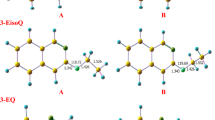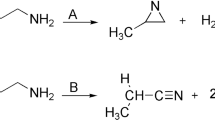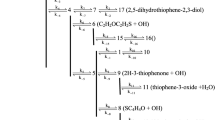Abstract
WHILE we were investigating the behaviour of certain gaseous alkyl and alkylene bromides at high temperatures, with the view of finding out how the energy of activation was related to the zero point energies (or vibration frequencies) of adjacent bonds (for example, tert.-butyl bromide with three C-C bonds might be expected to require a less activation energy than normal butyl bromide with two C–H and one C–C bonds) we found that the homogeneous nature of the decomposition could not always be predicted, and that the calculations made for ethylene bromide (C2H4Br2) by Sherman and Sun1 based on the Eyring method were somewhat misleading.
This is a preview of subscription content, access via your institution
Access options
Subscribe to this journal
Receive 51 print issues and online access
$199.00 per year
only $3.90 per issue
Buy this article
- Purchase on Springer Link
- Instant access to full article PDF
Prices may be subject to local taxes which are calculated during checkout
Similar content being viewed by others
References
J. Amer. Chem. Soc., 56, 1096 (1934).
Trumpy, Z. Phys., 93, 624 (1935).
Arnold and Kistiakowsky, J. Chem. Phys., 1, 166 (1933) ; Iredale and Martin, J. Phys. Chem., 38, 365 (1934).
Ogg, J. Amer. Chem. Soc., 58, 607 (1936).
Author information
Authors and Affiliations
Rights and permissions
About this article
Cite this article
IREDALE, T., MACCOLL, A. Thermal Decomposition of Ethylene Bromide. Nature 140, 24–25 (1937). https://doi.org/10.1038/140024b0
Issue Date:
DOI: https://doi.org/10.1038/140024b0
This article is cited by
-
Brom/Blei-Verhältnisse in Aerosolen und Autoabgasen
Fresenius' Zeitschrift für analytische Chemie (1985)
Comments
By submitting a comment you agree to abide by our Terms and Community Guidelines. If you find something abusive or that does not comply with our terms or guidelines please flag it as inappropriate.



